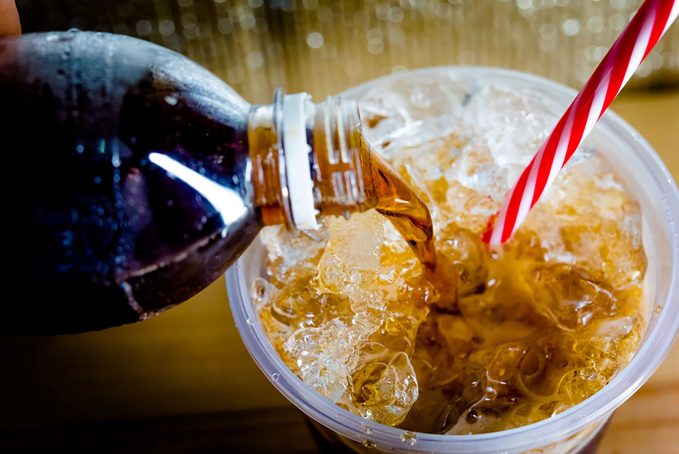Do Diet Drinks Cause Heartburn
We turn to a few health professionals about the possible health impacts of regular diet-soda consumption.
 Photo: Shutterstock / Vintage Tone
Photo: Shutterstock / Vintage Tone There's nothing quite like cracking open a cold can of diet soda to accompany a late-night pizza order or a piping hot plate of sesame chicken. Some days, it feels like a reward for small victories. Hours of productivity pave the way for a 2 p.m. trip to the vending machine and the bubbly stuff. But we've all seen the scary reports about the possible negative impacts of diet-soda consumption. In fact, if you drink diet soda around enough people, someone will start going off about how bad it is for you. Should we be discouraged from scrounging up quarters for a fizzy drink?
Research so far has been inconclusive. Many studies link low-calorie soda consumption to certain health risks, but science has yet to prove definitively that drinking diet soda causes strokes, heart attacks, vascular disease or depression, as frequently reported. This year, researchers with the long-running Framingham Heart Study published results in the American Heart Association journal Stroke, noting an association between consumption of artificially sweetened beverages and higher risks of stroke and dementia—but not cause and effect.
In this study and many others like it, reverse causality could provide a possible explanation. In other words, people who are already at great risk for disease (with pre-existing vascular disease, obesity or diabetes) made the switch from regular soda to diet soda. "[These individuals] are already at a higher risk for some of these [conditions] because of diet, lifestyle and genetics," says Marisa Moore, a registered dietitian nutritionist.
"But there are a ton of questions," Moore says. So while we don't know the exact effect that artificially sweetened sodas have on our health, there are some things to be concerned about.
1. Drinking Diet Soda Can Lead to Poor Food Choices
Raise your hand if you've said an emphatic "yes!" to tres leches and flan after saving 400 calories by drinking the zero-calorie soda instead of sangria. A study from the University of Illinois suggests that diet beverage drinkers often compensate for saved calories by eating more nutrient-poor foods, such as cookies, ice cream, fries and pastries. Isabel Valdez, a physician's assistant and instructor in the department of family and community medicine at Baylor College of Medicine in Houston, Texas, finds this to be true in her experience. "Sometimes people have the impression that they're drinking a diet soda and they can still eat extra food—foods that are high in fat, sugar and calories that are not healthy. This alone won't get them to health."
2. It May Irritate Your Stomach
Drinking excessive amounts of diet soda can sometimes affect the lining of the stomach. "Over time, it can get irritated from the carbonation," Valdez says. Heavy soda drinkers frequently develop indigestion, bloating and heartburn. Plus, carbonated drinks are a known trigger of acid reflux.
3. Diet Soda Can Cause Your Heart to Race
The recommended daily caffeine intake is around 400 milligrams of caffeine for most healthy adults, according to the Mayo Clinic. A can of Diet Coke has 46 mg of caffeine per 12-ounce can, according to Caffeine Informer. Diet Pepsi has 34 mg of caffeine per can. A 2-liter bottle of Diet Coke has 260 mg of caffeine. "Caffeine can increase the rate of their heart," Valdez says. "For some people that can be troublesome, especially if they don't realize they have a heart condition to begin with."
4. It Changes Your Sweetness Perception
Artificial sweeteners in diet soda and other sugar-free drinks are exponentially sweeter than natural sugar. "We kind of get used to this hyper sweetness," Moore says. "It takes away from something that's naturally sweet, like a piece of fruit."
5. Diet Soda Messes with Your Gut
We are getting so much new information about how gut bacteria help us regulate many things in our bodies, from our metabolism to possible hunger, Moore says. What's more, scientists are finding more and more that the bacteria in our gut environment is a big part of the body's microbiome—a delicate, complex ecosystem—and that too much diet soda may actually alter the digestive system's ability to process glucose, the carbohydrate that's our bodies' main power source. While it's important to remember that there has not been any definite causal link between diet soda and diabetes, high levels of consumption may lead to an increased susceptibility to disease.
6. It May Damage Teeth
"There are a couple of specific acids that are commonly used in diet soda that give it that tart, tangy flavor we find appealing," says Edmond Hewlett, D.D.S., an American Dental Association spokesperson and professor at the UCLA School of Dentistry. Unfortunately, these acids also have the potential to erode tooth enamel over time. This probably won't happen if you have a diet soda occasionally, Hewlett says. It's all about the frequency and length of exposure.
If you hope to cut back on diet soda for any of these reasons or others, Moore suggests baby steps. "Whenever someone is trying to cut back on regular sodas or cut back on any type of cookies or treats, I usually recommend they take a slow approach rather than do it cold turkey, which is difficult," she says. Tea is a smart alternative to diet soda because of the range of flavors. Or switch to sparkling water if you miss the fizziness of diet soda.
"Unpack your habit and see why you're craving it every day," Moore says. "Is it something sweet that you want? Is it the caffeine? Pick a substitute that would fit that need."
Do Diet Drinks Cause Heartburn
Source: https://www.tasteofhome.com/article/the-truth-about-diet-soda/#:~:text=Drinking%20excessive%20amounts%20of%20diet,known%20trigger%20of%20acid%20reflux.